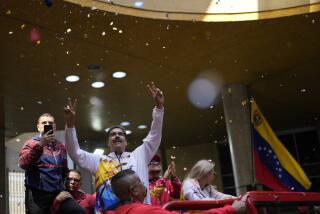Kasparov’s next move: a run for the presidency
- Share via
MOSCOW — Former world chess champion Garry Kasparov entered Russia’s presidential race Sunday, raising prospects that the Western-oriented democratic opposition might field several candidates in the contest this March -- something that Kasparov had originally sought to avoid.
Kasparov received 379 of 498 votes at a national congress held in Moscow by the Other Russia coalition, spokeswoman Lyudmila Mamina said.
“I will do everything possible for the ideas of Other Russia to win,” Kasparov said at the congress. “This will work only if we stay united. . . . I know that the road will be difficult.”
Other Russia has sought to unite opponents of President Vladimir V. Putin across the political spectrum.
Another key figure in the coalition is Eduard Limonov, a writer who heads the group formerly known as the National Bolshevik Party. Because that group is banned, Limonov is often introduced at opposition events as leader of “the nyelzya bolshe proiznosit party,” which means “the party that you are not allowed to pronounce anymore.”
Former Prime Minister Mikhail M. Kasyanov, widely viewed as potentially the most influential opposition candidate, was a founding leader of Other Russia but split with the group this summer. He now heads his own party, People for Democracy and Justice, and has made it clear that he intends to run for president.
Grigory A. Yavlinsky, leader of the human rights-oriented Yabloko party, has also said he will contest the presidential election.
None of the opposition contenders are guaranteed places on the ballot.
Their candidacies still need to be registered and could be blocked.
Other Russia also chose Kasparov to be one of three candidates to head the coalition’s list in parliamentary elections in December, if it is able to participate. The others are Limonov and former Central Bank head Viktor Gerashchenko.
Under Russian law, only individual political parties can participate in the parliamentary vote, and Other Russia’s parties have not been officially registered as eligible.
Putin enjoys popularity ratings above 70%, but the constitution requires him to step down at the end of his second term, next spring.
Most observers believe that voters, influenced by state-controlled television, will endorse whomever Putin selects as his preferred successor.
Among the contenders seen as most likely to win the Kremlin’s backing are Prime Minister Viktor Zubkov and First Deputy Prime Ministers Dmitry Medvedev and Sergei B. Ivanov.
More to Read
Sign up for Essential California
The most important California stories and recommendations in your inbox every morning.
You may occasionally receive promotional content from the Los Angeles Times.













